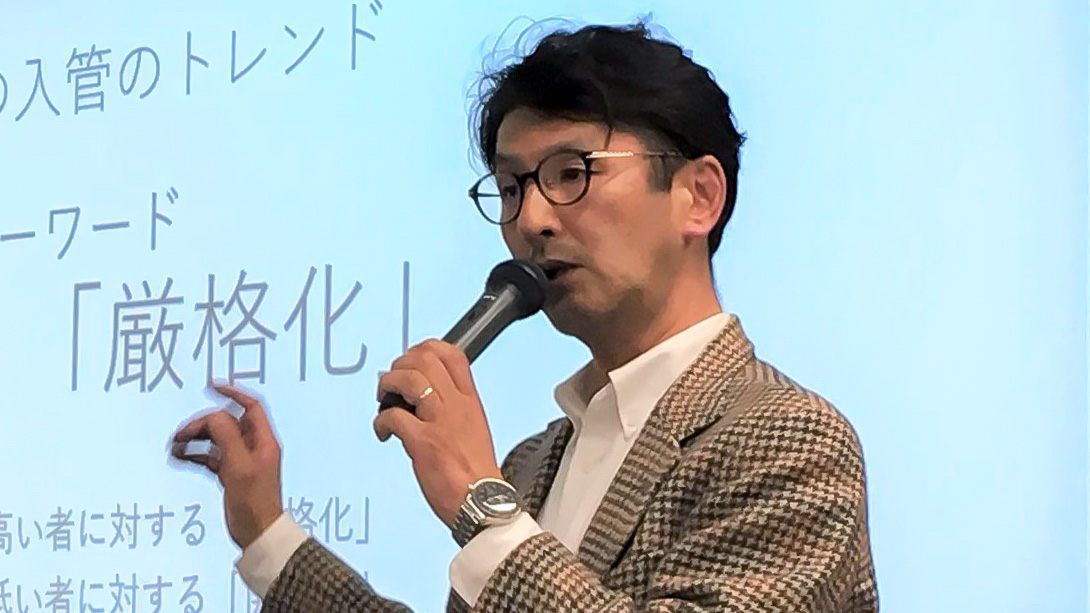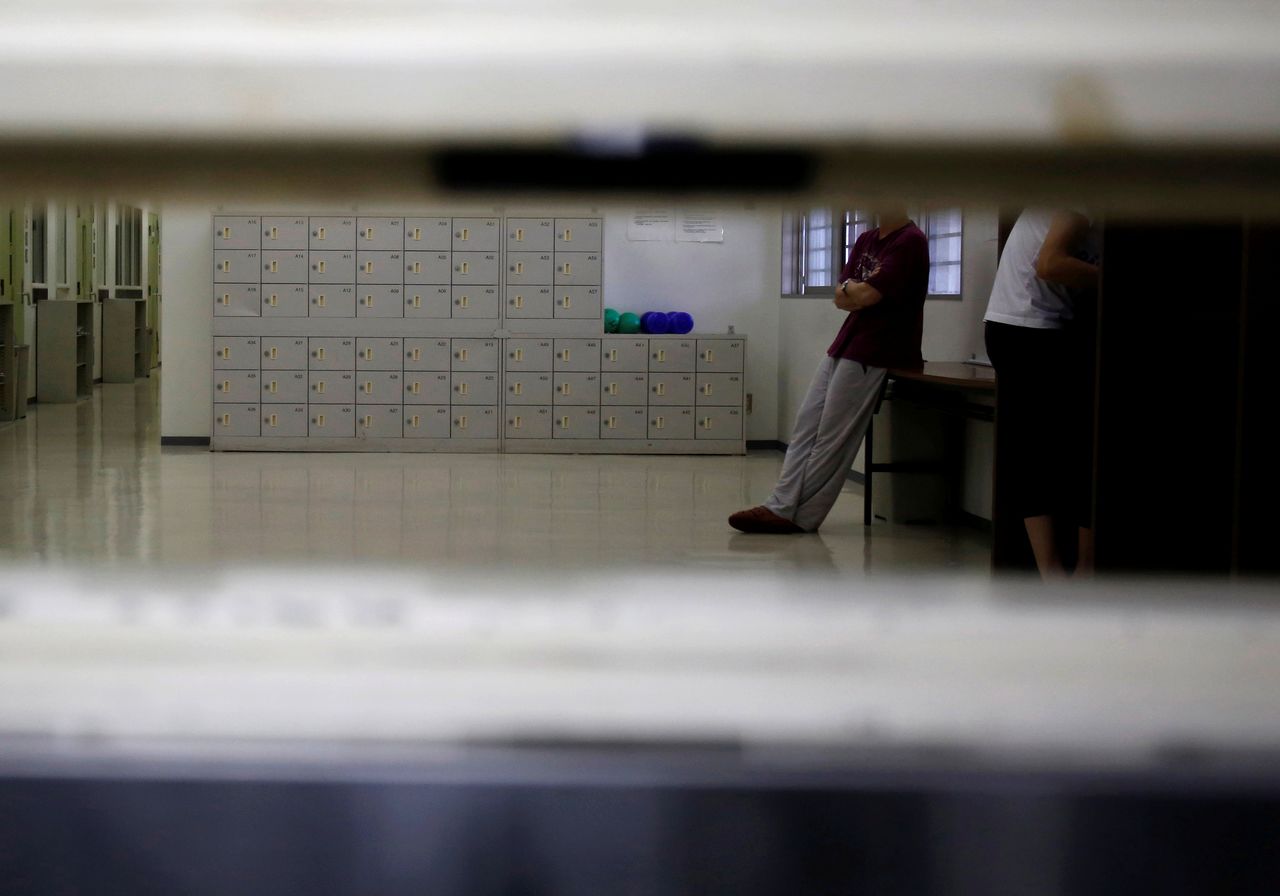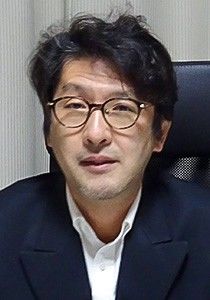
Japan Needs to Reform its “Black Box” Approach to Immigration Law
Society Politics- English
- 日本語
- 简体字
- 繁體字
- Français
- Español
- العربية
- Русский
A Lack of Compassion
After an early career that included probing into the Aum Shinrikyō terrorist attack for the Public Security Intelligence Agency, Kinoshita Yōichi moved to the Immigration Bureau (now the Immigration Services Agency) in the spring of 2001. Later that year, the September 11 terrorist attacks in the United States set alarm bells ringing in agencies around the world.
“Suddenly, we were forced to confront the threat of terrorism on a daily basis,” Kinoshita recounts. “I think everyone in the Immigration Bureau felt a genuine sense of alarm, myself included.” Although he says he did not feel particularly passionate about his job, he admits he recognized the danger and took his duties seriously. “I could see that letting just anyone into the country risked inadvertently allowing a terrorist to slip in too, potentially exposing the country to an attack.”
Kinoshita initially worked in the Verification Department of the bureau. “Basically, I was responsible for making sure that the details in a person’s application checked out.” If an applicant claimed to be married, to work at a certain location, or to have their own business, Kinoshita would go out to the addresses provided and check if this was really the case. After a stint at Haneda Airport, Kinoshita from 2006 spent three years in the Adjudication Department as an immigration inspector. It was this experience that made him feel increasingly uncomfortable with the way the immigration system worked.
“I don’t have any problem with carrying out strict checks on foreign nationals for the sake of maintaining peace and public order,” he declares. “But the fact is that most of the people who overstay their visas are living quiet lives and minding their own business in a little corner of society somewhere. In many cases, they have been in Japan for so many years that they no longer have a strong connection to their home countries. I found it difficult to watch dispassionately when children born and raised in Japan were forcefully deported to countries they might never have seen before, simply because their parents were in the country illegally.”
The Immigration Black Box
Kinoshita joined the Adjudication Department while it was in the second year of a plan to halve the number of people in the country illegally within five years. He notes that there was more transparency in the bureau then than at any other time. “If a person was married to a Japanese citizen, they were almost certain to be granted special permission to stay in Japan [officially issued at the discretion of the minister of justice]. As for minors, children up to elementary school age were deported, even if they’d been born in Japan, while permission to remain was normally granted for children in junior high and above. The idea was that children in elementary school were still young enough to adapt to life in their parents’ countries, and that’s where the line in making decisions was drawn. Even if an officer had doubts about the policy, at least it was clear and made some kind of sense.”
Kinoshita was startled to find that the situation had drastically changed when he returned to the section in 2016 after several years in other departments. “For example, some people married to Japanese citizens would be granted special permission to remain, while others would be denied. It was impossible to know what standards were being used to make these decisions. It was like a black box.”
In 2006, the Ministry of Justice published its Guidelines on Special Permission to Stay in Japan, establishing a number of “positive factors” to be taken into consideration in applications. These included marriage to a Japanese citizen or permanent resident and a family relationship with children based on long-term settlement in Japan. However, Kinoshita argues that immigration agents do not set much store by them. “They view them merely as guidelines and not legally binding,” he says. “I think the main priority of these officials is to steadfastly preserve their prerogative to decide everything with a free hand.” He insists that they willfully refuse to acknowledge the guidelines as formal standards, even though it was their own bureau that drew them up in the first place. “They’re afraid that if the guidelines become legally binding, they will lose their discretion to decide things as they see fit.”
In 2017, Kinoshita decided to go to graduate school to study law in an attempt to get to the bottom of the uneasiness he was feeling about his job. Focusing his research on administrative discretionary powers, he looked at the decisions in cases that had gone to trial, comparing those that the state had won against those where rulings went in favor of plaintiffs. He wanted to understand how decisions were made and find legal evidence that would back up the authority of the immigration bureau. Instead, his doubts only grew. After completing his master’s, he decided to resign from the bureau. Today, he continues to campaign for reform, organizing study groups and seminars with the aim of highlighting problems with the country’s immigration system and encouraging change.
Free Rein
What normally happens when a person staying in the country illegally is apprehended, and how is a decision reached on whether the person should be given special permission to stay in Japan?
Kinoshita says there are several stages, the first of which is for an immigration control officer to investigate whether there has been a violation of immigration law. “After this initial step, the case then goes to an immigration inspector. If the foreign national agrees to leave Japan, a deportation order is issued. If the individual applies for special permission to remain in the country, however, there is another hearing, this time carried out by a special inquiry officer. At the end of the process, the minister of justice makes a formal decision to either deport the individual or grant him or her special permission to stay.”
The law, though, does not establish strict criteria for immigration officials to follow in processing a case. In practice, officials interview an applicant and compile a report detailing the reasons why the person wishes to continue to reside in Japan. But Kinoshita points out that the way reports are written varies depending on the official, and that the final decision, although theoretically made by the minister of justice, is in practice left to the prerogative of the head of the regional immigration bureau handling the case. “In other words, whether a person is granted special permission to stay in Japan or not depends entirely on the personal feelings and whims of the official who happens to be heading up the local agency.”
The government recently shelved an immigration reform bill that it had argued would have made these decisions more transparent. Kinoshita, however, says the proposed legislation fails to address the issues adequately.
“The current process aims to establish that a person is in the country illegally. In that sense, you could say it’s a positive step that the government wants to shift to a system based on the idea of applying for special permission to stay from the outset. But it’s impossible to know how decisions will be made. Will it be a cautious, several-step process? How would a person apply? Who gets to carry out the hearings? The bill left all these details up in the air. Or more precisely, they would be determined according to the regulations of the Ministry of Justice. In other words, everything would still be left to the internal rules of the Immigration Services Agency. In the end, the proposals would have done nothing to address the fundamental problem of a basic lack of transparency in the decision-making process.”
He says a more straightforward approach would be to make the guidelines that already exist legally binding, but emphasizes that immigration authorities would never support such a move. “The bill contains provisions relating to special permission to stay, and at a glance appear to resolve the issue. In fact, though, the provisions are more or less meaningless. They identify various factors like family circumstances, the applicant’s conduct, and details of entry into Japan to be considered when deciding whether to grant permission to stay, but it’s just a list. Determining the standards to be applied based on these factors is the most important component of the decision-making process and the provisions do not address this point. One section of the proposed revision (to the immigration law) stipulates that consideration will be given to situations in Japan and abroad and to the potential impact on the unauthorized immigrant, but this in effect gives immigration officials a free hand to decide things as they like.”
Closed System
Kinoshita recognizes that not all foreign nationals who resist deportation orders have valid reasons preventing them from returning to their home countries, and that the Japanese public would disapprove of any move to allow such individuals to remain unconditionally, anyway. However, he insists that when talking about the tragedy of endless deportation battles and long-term detention, it is wrong to place all the blame on the side of the foreign national who refuses to accept a deportation order. “Given the lack of clarity about standards for determining the immigration status of a foreign national who has overstayed a visa and the general lack of transparency in the system, it should come as no surprise that many individuals refuse to meekly accept the decision of the authorities. If they ask why their application to remain in Japan has been refused, they just get the pat answer that the decision was based on a comprehensive appraisal. If they push for more details, they’re then told that no further response can be given. I know what it’s like because I’ve had to make similar statements myself.”

Detainees mill around the detention center at the Tokyo Regional Immigration Bureau in a photo from 2016. (© Reuters)
The proposed revisions to the immigration law make it easier to deport people by changing the regulations on applications for asylum. At the moment, a deportation order is effectively suspended if the person in question applies for refugee status. The proposed amendments to the law would limit the number of appeals that can be made and make applicants subject to deportation after applying for refugee status a third time. Applicants from some countries would face the additional requirement of going to the embassy of their home country to obtain a passport, a condition meant to apply pressure on the foreign national and speed up the deportation process.
“It’s certainly true that the present system makes it extremely difficult to deport an individual. There’s no limit to the number of times a person can apply for refugee status, so cases can drag on almost indefinitely. Certainly, people in some cases simply apply for refugee status as a way of avoiding deportation. It’s a complicated problem and it’s easy to understand why the government wants to address the situation by placing limits on the number of times a person can apply. But this would have a catastrophic effect on some individuals.” Kinoshita points to the many Kurds and Rohingya who have repeatedly applied for asylum in Japan only to have their applications denied each time. “Clearly, not every person who submits multiple applications is looking to exploit the system.”
The draft revisions are based on recommendations submitted in June 2020 by a government panel of experts on detention and deportation issues. The panel suggested that third-party checks should be required if the authorities wanted to start the deportation process after the third application for refugee status, but the proposed revisions omit this. “In a criminal case, the police, prosecutor, and court each handle different stages of the case. With immigration, the same bureau handles all three roles, a fundamental problem that the draft revisions failed to address.”
Aside from the proposed reforms, Kinoshita says that existing procedures for recognizing refugee status are at least somewhat better than those for dealing with individuals who have overstayed their visa. “There is a system for appeals through a refugee examination counselor. So even if the primary adjudication doesn’t grant refugee status, an applicant can move onto a secondary consideration of their case. But immigration authorities are still in charge of selecting and appointing the examination counselor and they are the ones who oversee cases. From the applicant’s perspective, the decision ultimately remains within the jurisdiction of the Ministry of Justice.”
Kinoshita says that as there is no institution in place to check the decisions of the immigration agency, even foreign nationals working legally in Japan have no recourse except to bring a legal case if immigration authorities decline to renew their visa for any reason. However, Japanese law grants broad discretionary powers to government ministries and agencies, and rulings are made in favor of the state in around 98% of cases that go to court.
Dissatisfaction for All
Several recent high-profile cases involving the long-term detention of foreign nationals facing deportation have made national headlines and led to widespread outrage. One detainee starved to death after going on hunger strike to protest his conditions, and there have been allegations of violence and maltreatment by immigration officials. In March this year, a Sri Lankan woman died in the immigration detention center in Nagoya. The government came in for harsh criticism from opposition parties over its handling of immigration and asylum issues, prompting it to abandon plans to get its proposed revisions to immigration law passed in the current session of the Diet.
“I think a lot of immigration officials are well aware that the current situation is far from ideal. When I was still at the agency, my colleagues and I often talked about things that struck us as strange. But as the law doesn’t provide any clear guidance, even if officials feel uncertain about the screenings and the decisions they make, they have no alternative but to get on with their work the best they can in spite of any reservations about the way the system is being run.”
Kinoshita says that this leads to physical and mental exhaustion. “Most officials aren’t in favor of indefinite detention. Even the report by the government’s advisory panel noted the high numbers of officials who quit their jobs because of the heavy physical and mental stress of working with detainees and the deportation process. The current situation involves suffering for everyone, officials included. At the risk of sounding overly negative, I think the proposed revisions would do nothing to improve the situation, at least as far as the burden on immigration officials is concerned, and could even wind up making matters worse.”
Asked what he thinks should be done, Kinoshita declares: “There needs to be more transparency. As long as the bureau has sole authority over immigration cases, appeals, and detention decisions, without any involvement by courts or third parties, the black-box situation will remain unchanged. The same is true of provisional release. It is absurd that there are actually people with no legal residential status who have remained on provisional release for long stretches, a decade or more in some cases. If people are going to be granted provisional release, the government should at least legalize their status rather than letting them languish in limbo year after year. Once their status is regularized, people can work to support themselves and pay taxes. The standards for regularizing legal status should be made clear in law.”
(Originally published in Japanese, based on an interview by Itakura Kimie of Nippon.com. Banner photo: Kinoshita Yōichi, campaigner for immigration law reform. Courtesy of Kinoshita Yōichi.)
foreign workers immigration Immigration Control and Refugee Recognition Act immigrants immigration policy
